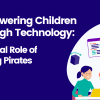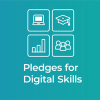Coding Pirates Denmark: promoting digital creativity amongst children
Did you know that the world of ICT can also be fun? Did you know we can learn coding through club nights?
Coding Pirate Denmark to the rescue: the Danish not-for-profit organisation Coding Pirates offers a unique and inclusive environment, where children and young people can enhance their digital competences and explore creative solutions - through club nights.
Coding Pirates: a playing ground for youngsters
The idea behind Coding Pirates goes all the way back to 2013. Found by Martin Exner and Christian Hjorth Lund, following a successful pilot project in November 2013, Coding Pirates was "born" in the start of 2014 when the pair started their first team in the university. Since then, the interest, and membership to, Coding Pirates has grown tremendously, and the organisation has spread across several locations throughout Denmark by setting up local association centres.
At the heart of Coding Pirates lies the idea that the initiative stems from meeting a need of society, rather than simple economic gain. Behind the programme stand a diverse group of IT professionals, teachers, programmers, developers, researchers, and entrepreneurs. Their common goal? To provide a meeting point and an open space for children and young people, who want to develop their tech skills together.
Openness and diversity in leadership
The initiative is supported by Microsoft, also one of the first sponsors of Coding Pirates. Today, they contribute with locations and hosts a Coding Pirates club session every Tuesday. Microsoft volunteers use the club night as a way to teach children and interested young people about different technology topics.
The Manifesto as the Fundamental Law of the Organisation
A distinctive feature of Coding Pirates is the Manifest of the Association, which acts as the Fundamental Law and the Purpose Pact. The Manifesto sets the framework for the organisation’s mission, networks, association structure, values and vision. This creates a clear direction and a sense of community among local departments, volunteers and children, and underlines the importance of democratic and open processes.
Why is this a good practice?
Coding Pirates is a nation-wide organisation, consisting of several local communities from all over Denmark. Coding Pirates relies heavily on volunteers, and in the words of staff, the organisation could not exist without them. They are the backbone and foundation of the organisation.
Since its start, Coding Pirates has grown - with activities extended to other regions and local contexts, the initiative scores high in both accessibility and sustainability. Volunteers come from different backgrounds in Denmark, but share a common passion: to offer a space where children can be geeks in technology - and learn the basics of electronics, programming and others through play.
Coding Pirates prioritises community and democratic processes as part of their values. This not only creates a safe environment for children, but also involves volunteers and local departments in decision-making. Open processes allow all stakeholders to contribute to the development of the organisation.
Coding Pirates Denmark is a noticeable example of a good practice in the field of IT education for children. Their non-profit approach, diversified leadership, clear purpose, and use of a Manifest as a map of core values, create a unique learning experience for children and young people. By promoting creativity and productive IT skills among children and engaging them in democratic processes, Coding Pirates sets a nation-wide standard of how organisations can inspire and train future generations of digital creators. Their approach serves as a model for others who want to contribute to children’s digital education and creative skills.
FIRST® LEGO® League in Denmark
In 2023, Coding Pirates became the operator of the FIRST® LEGO® League in Denmark, i.e. has become an essential part of the global knowledge and technology tournament for 4-16-year-old children and young people, which introduces children to STEM (science, technology, engineering & math). For Coding Pirates, it's an obvious match.
In First® LEGO League®, children and young people are inspired to become the engineers, researchers and problem solvers of the future. Through current societal issues, participants experience science and technology in an engaging and exciting way. FIRST® LEGO® League is an interdisciplinary course based on the concepts of STEAM (Science, Technology, Engineering, Art, Math) and targeted courses that can be used in daycare facilities, schools, leisure clubs and associations.
Very few materials in the world are as thoroughly prepared and didactically adapted as those from LEGO Education and FIRST® LEGO® League. Therefore, for more than 20 years, they have excited children and young people, students and teachers and volunteers around the world, and still do. In 2022, more than 300,000 young people in 80 countries actively participated in this year's challenge, and the ambition remains to increase these numbers.
In addition to insight into this year's current social theme, it creates fertile ground for the development of a myriad of competencies that are the building blocks for growing up and becoming a whole person and being able to make decisions/choices!
Visit Coding Pirates here and learn more about what they do!





